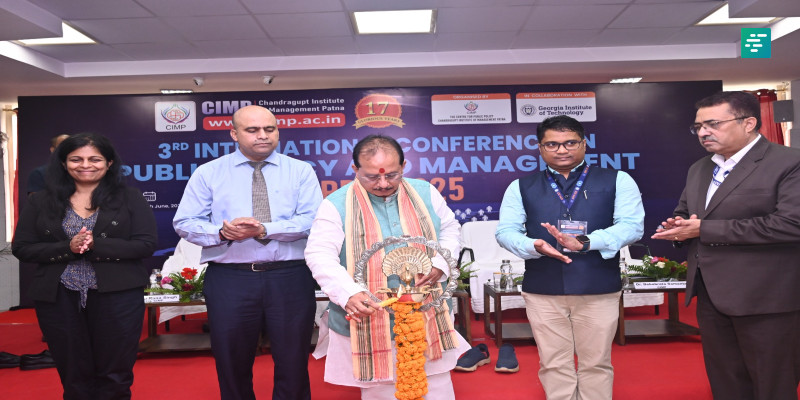
Third International Conference on Public Policy and Management (ICPPM 2025) Inaugurated at CIMP
- Campus Updates
- 26 Jun, 2025
- 317
The Third International Conference on Public Policy and Management (ICPPM 2025) was inaugurated this morning at Chandragupt Institute of Management Patna (CIMP), in the august presence of the Hon’ble Deputy Chief Minister of Bihar, Shri Vijay Kumar Sinha. Along with him, the inaugural session was graced by Prof. (Dr.) Rana Singh, Director, CIMP; Prof. Anjali Thomas from the Georgia Institute of Technology, Atlanta, USA; Shri Kumod Kumar, Chief Administrative Officer, CIMP; and Prof. Debabrata Samanta, Convenor of ICPPM 2025.
The inaugural session began with a welcome address by Prof. (Dr.) Rana Singh, Director of CIMP, warmly welcomed all the distinguished guests and delegates. He highlighted India’s ongoing efforts and significant progress towards achieving the Sustainable Development Goals (SDGs), setting the stage for the conference’s central theme. He also discussed the role of CIMP in strategic public policy and planning in Bihar. Following this, Prof. Debabrata Samanta, Convenor of ICPPM 2025 and Assistant Professor at CIMP, provided an overview of the conference, its objectives, and the importance of focusing on local governance as a driver of sustainable development. Prof. Anjali Thomas, from Georgia Institute of Technology, shared her excitement about engaging with Bihar’s policy landscape. She expressed particular interest in studying the state’s progress over the past decade and learning from its unique development trajectory.
Shri Vijay Kumar Sinha, the Hon’ble Deputy Chief Minister of Bihar, addressed the participants, warmly welcoming delegates from the Georgia Institute of Technology and lauding the spirit of collaboration. He particularly commended CIMP’s efforts in bringing together various stakeholders, including policymakers, academicians, government organizations, civil societies, and representatives from Panchayati Raj Institutions to discuss the current policy challenges in achieving Viksit Bihar@2047, leading to Viksit Bhart@2047 over the next two days. He applauded the conference’s focus on the critical role of institutions and policy in promoting inclusive and sustainable development while enhancing resilience to climate change. Shri Sinha emphasized the relevance of the conference theme, “Building Resilient Communities: Local Governance as a Catalyst to Sustainable Development,” in today’s development discourse, especially in the context of Bihar. He elaborated on transformative government initiatives like the Pradhan Mantri Jan Dhan Yojana and Direct Benefit Transfer (DBT), which have significantly reduced leakages and improved transparency in service delivery. He also discussed welfare schemes such as PM-KISAN and Kanya Samridhi Yojana, highlighting Bihar’s progressive stance on local governance, particularly regarding the 50 percent reservation for women in Panchayati Raj Institutions. The inaugural session concluded with a vote of thanks from Shri Kumod Kumar, Chief Administrative Officer of CIMP.
Prof. Anjali Thomas delivered the keynote address of the ICPPM 2025 from the Georgia Institute of Technology. In her address titled “(When) Do Politicians Influence Citizens’ Uptake of Government Welfare Programs? Evidence from a Field Experiment in North India,” she presented key findings from a field experiment studying citizens’ willingness to enrol in a government health insurance program targeted at marginalized groups. Her research revealed that politicians’ influence on the uptake of such programs is not uniform; rather, it is selective and significantly shaped by whether citizens are part of their political support base. Contrary to popular belief, this influence does not stem from politicians perceived expertise or trustworthiness. Instead, exploratory results suggest that the perceived ability of politicians to facilitate program access through personal networks plays a more decisive role. These insights provide a nuanced understanding of the implications of political endorsements in implementing welfare programs.
The first day of ICPPM has featured two technical sessions, during which fifteen research papers were presented. These sessions focused on two critical themes: the role of local governments and institutions in localizing the Sustainable Development Goals (SDGs), and policies for managing natural resources in pursuit of SDGs and climate change objectives. Researchers and scholars from premier institutions such as the Indian Institutes of Technology (IITs), Indian Institutes of Management (IIMs), central universities, and other leading academic institutions across India contributed to the discussions, which fostered meaningful academic exchange and policy insight.
In the post-lunch session, the conference hosted a significant land policy roundtable titled “Reporting of SDG Land Indicators in India and the Role of Local Governments and Institutions.” The panel brought together distinguished experts, including Prof. Soumyananda Dinda, Economist at the University of Burdwan; Prof. Ranjan Kumar Ghosh from the Indian Institute of Management Ahmedabad; Ms. Pinaki Halder, Senior Land Tenure Advisor for South Asia at Landesa; and Dr. Richa Joshi, Research Lead at Landstack. The session was moderated by Shri Deepak Sanan, IAS (Retd.), Director of Landstack and former Additional Chief Secretary to the Government of Himachal Pradesh.
The discussion focused on the challenges surrounding land data documentation and collection, particularly in the context of land records and statistical surveys. Panellists emphasized the importance of strengthening local institutions and integrating land titles with local development plans such as Gram Panchayat Development Plans (GPDPs). This integration, they argued, is essential for improving the tracking and reporting of SDG-related land indicators and for enhancing their alignment with broader development outcomes.
The day concluded with a special address by Prof. Charles Hankala from Georgia State University, who offered thoughtful reflections on the discussions and the broader implications for public policy, governance, and sustainable development. The address marked a fitting end to a day rich in scholarly dialogue and policy engagement.
